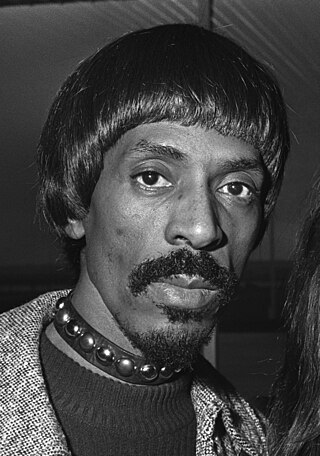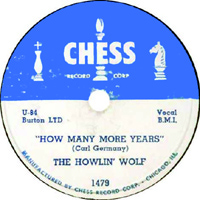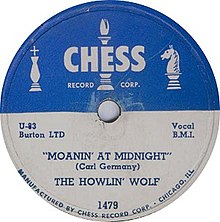
Izear Luster "Ike" Turner Jr. was an American musician, bandleader, songwriter, record producer, and talent scout. An early pioneer of 1950s rock and roll, he is best known for his work in the 1960s and 1970s with his then-wife Tina Turner as the leader of the Ike & Tina Turner Revue.

"Rocket 88" is a song that was first recorded in Memphis, Tennessee, in March 1951. The recording was credited to "Jackie Brenston and his Delta Cats", who were actually Ike Turner and his Kings of Rhythm. The single reached number one on the Billboard R&B chart.

Chester Arthur Burnett, better known by his stage name Howlin' Wolf, was an American blues singer and guitarist. He was at the forefront of transforming acoustic Delta blues into electric Chicago blues, and over a four-decade career, recorded blues, rhythm and blues, rock and roll, and psychedelic rock. He is regarded as one of the most influential blues musicians of all time.

Modern Records was an American record company and label formed in 1945 in Los Angeles by the Bihari brothers. Modern's artists included Etta James, Joe Houston, Little Richard, Ike & Tina Turner and John Lee Hooker. The label released some of the most influential blues and R&B records of the 1940s and 1950s.
RPM Records was an American Los Angeles-based record label launched in 1950. This is not the same RPM used by Tony Bennett, nor is it related to labels in the UK and South Africa.

Moanin' in the Moonlight is a compilation album and the first album by American blues artist Howlin' Wolf, released by Chess Records in 1959. It contains songs previously issued as singles, including one of his best-known, "Smokestack Lightning". Rolling Stone ranked it number 477 on its 2020 list of "the 500 Greatest Albums of All Time".

Rosco N. Gordon III, sometimes billed as Roscoe Gordon, was an American blues singer, pianist, and songwriter. He is best known for his hit songs "Booted," (1952), "No More Doggin'" (1952), and "Just a Little Bit" (1960). Gordon was a pioneer of the Memphis blues style. He played piano in a style known as the "Rosco rhythm," with the emphasis on the off-beat. This rhythm was an influence on later musical styles such as Jamaican ska and reggae.

"Smokestack Lightning" is a blues song recorded by Howlin' Wolf in 1956. It became one of his most popular and influential songs. It is based on earlier blues songs, and numerous artists later interpreted it.

"Evil", sometimes listed as "Evil (Is Going On)", is a Chicago blues song written by Willie Dixon. Howlin' Wolf recorded the song in Chicago for Chess Records in 1954. It was included on the 1959 compilation album Moanin' in the Moonlight. When he re-recorded it for The Howlin' Wolf Album in 1969, "Evil" became Wolf's last charting single, reaching number 43 Billboard R&B chart.

"Forty-Four" or "44 Blues" is a blues standard whose origins have been traced back to early 1920s Louisiana. However, it was Roosevelt Sykes, who provided the lyrics and first recorded it in 1929, that helped popularize the song. "Forty-Four," through numerous adaptations and recordings, remains in the blues lexicon eighty years later.

"You Know I Love You" is a song written and recorded by B.B. King. Released on RPM Records in 1952, it was King's second No. 1 single on the Billboard R&B chart. King's friend and collaborator Ike Turner played piano on the original recording. The song was included on King's debut album Singin' The Blues in 1957.

His Best is a greatest hits album by American blues musician Howlin' Wolf. The album was originally released on April 8, 1997 by MCA/Chess Records, and was one of a series of releases by MCA for the 50th anniversary of Chess Records that year. Ten years later – on April 17, 2007 – the album was reissued by Geffen Records as The Definitive Collection.

Raymond Earl Hill was an American tenor saxophonist and singer, best known as a member of Ike Turner's Kings of Rhythm in the 1950s. He also recorded as a solo artist for Sun Records and worked as a session musician.

"How Many More Years" is a blues song written and originally recorded by Howlin' Wolf in 1951. Recorded at the Memphis Recording Service – which later became the Sun Studio – it was released by Chess Records and reached No. 4 on the Billboard R&B chart. Musician and record producer T-Bone Burnett has described "How Many More Years" as "in some ways ... the first rock’n’roll song". It was a double-sided hit with "Moanin' at Midnight", which reached No. 10 on the R&B chart.

The Sun Sessions is a collection of early recordings that musician Ike Turner and his band the Kings of Rhythm recorded from 1951–1958 for Sun Records. Many of the recordings were previously unissued until Charly Records released the album Sun: The Roots Of Rock: Volume 3: Delta Rhythm Kings in 1976. The tracks on The Sun Sessions were digitally remastered and released by Varèse Sarabande in 2001.

Howling Wolf Sings the Blues is a compilation album by blues musician Howlin' Wolf, which was released by Crown Records in 1962. The original album included eight songs recorded for Modern Records between 1951 and 1952, including those tracks that were released as singles by the RPM, and an additional two instrumentals by Joe Hill Louis. The album was re-released in 1970 by United Records with the alternative title Big City Blues.

This article contains information about albums and singles released by of American musician and bandleader Ike Turner.
Houston Boines was an American blues singer and harmonica player. Boines, accompanied by guitarist Charley Booker, was recruited by talent scout Ike Turner to record for Modern Records in 1952. He also recorded for Sun Records in 1953.

"No More Doggin'" is a rhythm and blues song written and originally recorded by blues musician Rosco Gordon in 1952. The song featured Gordon's signature "Rosco Rhythm" piano style which became a precursor to Jamaican ska music.
The Beale Streeters were a Memphis-based R&B coalition of musicians, which at times included John Alexander, Bobby Bland, Junior Parker, B.B. King, Earl Forest, Willie Nix, and Rosco Gordon. Initially, they were not a formal band, but they played at the same venues and backed each other during recording sessions.

















